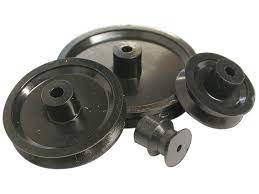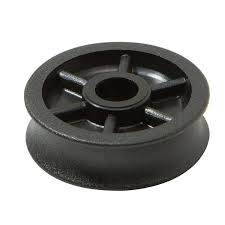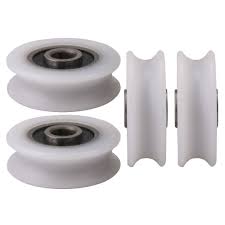Product Description
Plastic pulley:
| Type: | RS-RPP150/40,RS-RPP150/60,RS-RPP180/60 |
| Material: | Nylon |
| Color: | Black, and we could produce the color as per request |
Rollmax Shutter Component Co., Ltd.specialized in plastic injection,hardware and aluminum products for the rolling shutter accessories like handle crank,side frame,end cap,drive wheel,etc.
Goods in nice quality and competitive price.
Company website: rollmax
Company address:No.18 Bangang Rd,Luotuo Industry Park,HangZhou.
| Kind: | Pulley |
|---|---|
| Structure: | Horizontal |
| Open Type: | Manual |
| Style: | Modern |
| Usage: | Roller Shutter |
| Material: | Plastic |
| Samples: |
US$ 2/Piece
1 Piece(Min.Order) | |
|---|
| Customization: |
Available
| Customized Request |
|---|
How do plastic pulleys impact the performance of garage door systems?
Plastic pulleys have a significant impact on the performance of garage door systems. Here’s a detailed explanation:
1. Smooth and Quiet Operation:
Plastic pulleys are designed to provide smooth and quiet operation in garage door systems. The use of plastic materials, such as high-density polymer or nylon, in the pulleys reduces friction and minimizes noise during the opening and closing of the garage door. The smooth movement facilitated by plastic pulleys enhances the overall user experience and ensures a quieter operation, especially compared to metal pulleys that can create more noise and require more lubrication.
2. Durability and Longevity:
Plastic pulleys offer excellent durability and longevity in garage door systems. The plastic materials used in the construction of these pulleys are resistant to corrosion, rust, and moisture, making them suitable for outdoor applications. Plastic pulleys are less susceptible to wear and tear, which extends their lifespan and reduces the frequency of replacements. Their durability ensures consistent performance and reliable operation of the garage door system over an extended period.
3. Reduced Maintenance:
Due to their durable nature and self-lubricating properties, plastic pulleys require less maintenance compared to metal pulleys. The plastic materials used in the pulleys do not require frequent lubrication, unlike metal pulleys that may require regular oiling or greasing. This reduces the maintenance efforts and costs associated with keeping the garage door system in optimal condition. Additionally, plastic pulleys are less prone to accumulation of dirt or debris, further minimizing the need for cleaning or debris removal.
4. Improved Safety:
Plastic pulleys contribute to improved safety in garage door systems. The use of plastic materials reduces the risk of injury or damage in case of accidental contact with the pulleys while the door is in motion. Unlike metal pulleys, plastic pulleys have a smooth and lightweight construction, reducing the potential for accidents or injuries. Additionally, the reduced friction and smoother movement provided by plastic pulleys decrease the strain on the garage door opener and other components, enhancing the overall safety and reliability of the system.
5. Cost-Effectiveness:
Plastic pulleys offer a cost-effective solution for garage door systems. They are generally less expensive than metal pulleys, making them a budget-friendly option for homeowners and businesses. Moreover, the durability and longevity of plastic pulleys result in reduced maintenance and replacement costs over time. The cost-effectiveness of plastic pulleys makes them a popular choice in residential and commercial garage door systems.
6. Compatibility:
Plastic pulleys are designed to be compatible with various garage door systems. They are available in different sizes and configurations to match the specific requirements of different door types and mechanisms. Plastic pulleys can be easily installed or replaced in existing garage door systems, providing a hassle-free solution for homeowners and professionals.
7. Energy Efficiency:
Plastic pulleys contribute to energy efficiency in garage door systems. The smooth and low-friction operation of plastic pulleys reduces the amount of energy required to open and close the garage door. This energy efficiency can result in lower electricity consumption and reduced costs over time, especially in cases where the garage door is frequently used.
Overall, plastic pulleys have a positive impact on the performance of garage door systems. They provide smooth and quiet operation, durability, reduced maintenance, improved safety, cost-effectiveness, compatibility, and energy efficiency. These benefits make plastic pulleys a preferred choice for homeowners and professionals seeking reliable and efficient garage door operation.
What maintenance procedures are necessary to ensure the reliability of plastic pulleys?
To ensure the reliability of plastic pulleys, several maintenance procedures should be followed. Here’s a detailed explanation:
1. Regular Inspection:
Regular inspection is crucial for identifying any signs of wear, damage, or degradation in plastic pulleys. Inspect the pulleys periodically to check for cracks, excessive wear, or any other visible issues. Pay attention to the pulley’s grooves, edges, and mounting points. If any damage is detected, the pulley should be replaced promptly to prevent unexpected failures or accidents.
2. Lubrication:
Appropriate lubrication is important to ensure the smooth operation and longevity of plastic pulleys. Follow the manufacturer’s recommendations for lubrication intervals and the type of lubricant to be used. Apply lubricant to the pulley’s bearings or bushings as specified. Proper lubrication reduces friction, minimizes wear, and helps maintain the pulleys’ performance and reliability.
3. Cleaning:
Clean plastic pulleys regularly to remove dirt, dust, or debris that may accumulate on the surface. Use a soft brush or cloth to gently clean the pulleys, ensuring that no abrasive materials or harsh chemicals are used that could damage the plastic material. Clean pulleys help prevent contaminants from entering the system and interfering with the pulley’s movement or the overall performance of the equipment.
4. Belt or Chain Tension:
Check and adjust the tension of belts or chains connected to plastic pulleys. Proper tension is crucial for efficient power transmission and to prevent slippage. Follow the manufacturer’s guidelines to determine the correct tension for the specific application. Ensure that the belts or chains are not too loose or too tight, as both conditions can lead to premature wear or failure of the pulleys.
5. Alignment:
Proper alignment of plastic pulleys is essential for their reliable operation. Misalignment can cause excessive vibrations, premature wear, and increased stress on the pulleys and associated components. Regularly check the alignment of the pulleys and make any necessary adjustments. Follow the manufacturer’s recommendations for alignment procedures to ensure optimal performance and longevity of the pulleys.
6. Environmental Considerations:
Consider the environmental conditions in which the plastic pulleys are operating. Extreme temperatures, exposure to chemicals, or other harsh conditions can impact the pulley’s reliability and lifespan. If the environment poses specific challenges, choose plastic pulleys that are resistant to the prevailing conditions. For example, select pulleys made from materials with high-temperature resistance or chemical resistance, as required.
7. Manufacturer’s Guidelines:
Always refer to the manufacturer’s guidelines and recommendations for maintenance procedures specific to the plastic pulleys being used. Manufacturers often provide detailed instructions on inspection, lubrication, cleaning, and other maintenance tasks. Adhering to these guidelines ensures that the maintenance procedures are carried out correctly and in accordance with the manufacturer’s specifications, maximizing the reliability and lifespan of the plastic pulleys.
By following these maintenance procedures, operators can ensure the reliability and longevity of plastic pulleys. Regular inspection, proper lubrication, cleaning, belt or chain tensioning, alignment, considering environmental factors, and adhering to manufacturer’s guidelines are all vital in maintaining the optimal performance of plastic pulleys in various industrial applications.
Can you explain the key features and advantages of plastic pulleys?
Plastic pulleys offer several key features and advantages that make them suitable for various applications. Here’s a detailed explanation of the key features and advantages of plastic pulleys:
1. Lightweight:
One of the significant features of plastic pulleys is their lightweight construction. Compared to metal pulleys, plastic pulleys are considerably lighter, which can be advantageous in applications where weight reduction is desired. The lightweight nature of plastic pulleys makes them suitable for applications where minimizing overall system weight is important, such as in portable devices or equipment.
2. Corrosion Resistance:
Plastic pulleys are inherently resistant to corrosion. Unlike metal pulleys that may rust or corrode when exposed to moisture or certain chemicals, plastic pulleys maintain their integrity and functionality even in corrosive environments. This corrosion resistance makes plastic pulleys suitable for applications where exposure to moisture or chemicals is likely, such as in marine equipment or outdoor machinery.
3. Low Friction:
Plastic pulleys generally have low friction coefficients. This means that the contact between the pulley and the associated components, such as belts or ropes, is smoother, resulting in reduced frictional losses. The low friction properties of plastic pulleys contribute to improved efficiency and energy savings in various systems, such as conveyor belts, where reducing power consumption is desirable.
4. Noise Reduction:
Plastic pulleys offer inherent damping properties, which help reduce noise and vibration during operation. The damping effect of plastic materials absorbs vibrations and minimizes noise generation, resulting in quieter operation compared to metal pulleys. This makes plastic pulleys suitable for applications where noise reduction is important, such as in household appliances or office equipment.
5. Design Flexibility:
Plastic pulleys offer a high degree of design flexibility. They can be molded into various shapes, sizes, and configurations, allowing for precise customization. This flexibility in design enables specific features, such as flanges, grooves, or mounting options, to be incorporated directly into the pulley. Plastic pulleys can be tailored to meet the unique requirements of different applications, making them highly versatile in terms of design possibilities.
6. Cost-Effective:
Plastic pulleys are generally more cost-effective compared to pulleys made from other materials, such as metal, ceramic, or glass. The manufacturing process for plastic pulleys is typically less complex and less expensive, resulting in lower production costs. This cost advantage makes plastic pulleys a cost-effective choice for a wide range of applications, especially in situations where budget constraints are a consideration.
7. Electrical Insulation:
Plastic pulleys offer electrical insulation properties. Unlike metal pulleys that conduct electricity, plastic pulleys act as insulators, preventing the flow of electrical current. This electrical insulation characteristic is advantageous in applications where electrical conductivity needs to be avoided or isolated, such as in electronic devices or systems with sensitive electrical components.
8. Chemical Resistance:
Plastic pulleys exhibit resistance to various chemicals, depending on the specific plastic material used. They can withstand exposure to substances such as oils, fuels, solvents, and acids without degradation. This chemical resistance makes plastic pulleys suitable for applications where contact with chemicals or aggressive substances is expected, such as in industrial machinery or chemical processing equipment.
In summary, plastic pulleys offer key features and advantages including lightweight construction, corrosion resistance, low friction, noise reduction, design flexibility, cost-effectiveness, electrical insulation, and chemical resistance. These attributes make plastic pulleys suitable for a wide range of applications across industries such as automotive, consumer electronics, manufacturing, and more.
editor by CX
2023-11-09




